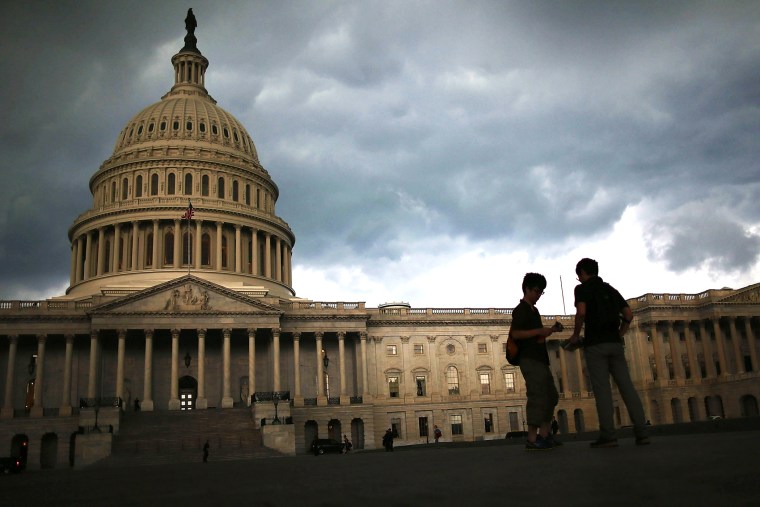At a White House cabinet meeting yesterday, Donald Trump sounded an optimistic note about his party's tax plans, declaring, "We're going to give the American people a huge tax cut for Christmas. Hopefully that will be a great, big, beautiful Christmas present."
It was right around this time that the non-partisan Tax Policy Center published an analysis that Republicans probably didn't like. The Associated Press reported:
Trump spoke as the Tax Policy Center said that while all income groups would see tax reductions, on average, under the Senate bill in 2019, 9 percent of taxpayers would pay higher taxes that year than under current law. By 2027, that proportion would grow to 50 percent, largely because the legislation's personal tax cuts expire in 2026, which Republicans did to curb budget deficits the bill would create.The policy center, a joint operation of the liberal-leaning Urban Institute and Brookings Institution, found that low-earners would generally get smaller tax breaks than higher-income people.
The full TPC report is available online here. It obviously contradicts House Speaker Paul Ryan's recent boast that "everybody" will see their taxes cut under his party's bill. (His office later said he "misspoke.")
It's worth pausing to appreciate how difficult a feat Republicans have pulled off with this proposal. Ordinarily, when policymakers propose raising taxes, the point is to reduce the deficit, increase government revenues, and bring the budget closer to balance. Trump and his GOP brethren have managed to craft a plan that would raise taxes on 50% of the country once the blueprint is fully implemented, while making the deficit bigger, not smaller.
That's not easy to do, but it's a reflection of just how much Republicans want to cut taxes for the wealthy and corporations.
The bulk of the tax increases would adversely affect Americans making between $55,000 and $90,000 -- who happen to be middle-class households who are ostensibly the target beneficiaries of the GOP legislation.
But perhaps just as important is the damage the Tax Policy Center's findings did to the other key claim at the heart of the Republicans' pitch.
To hear GOP officials tell it, their regressive tax plan, if passed, will supercharge the economy, to the point that it will pay for itself through increased growth and new jobs.
As TPM noted, the Tax Policy Center shredded this talking point.
Treasury Secretary Steve Mnuchin recently insisted that "not only will this tax plan pay for itself, but it will pay down debt." White House economic adviser Gary Cohn agreed, saying that "we can pay for the entire tax cut through growth over the cycle."Yet the new study by the Tax Policy Center finds that while the bill would somewhat boost the nation's economic output, leading to more revenue for the government, it would not be enough to offset the revenue lost by the tax cuts. The net effect of the bill would be to increase the deficit by $1.27 trillion over 10 years.The estimated growth would be lower than promised and the impact would diminish over time. The Tax Policy Center estimates that the tax cuts would increase the U.S. GDP by 0.6 percent in 2018, 0.3 percent in 2027, and 0.2 percent in 2037.
The question then becomes what, if anything, congressional Republicans intend to do with this information. If you're concerned that they'll ignore the evidence and reflexively support reckless tax breaks anyway, evidence be damned, you're not alone.
